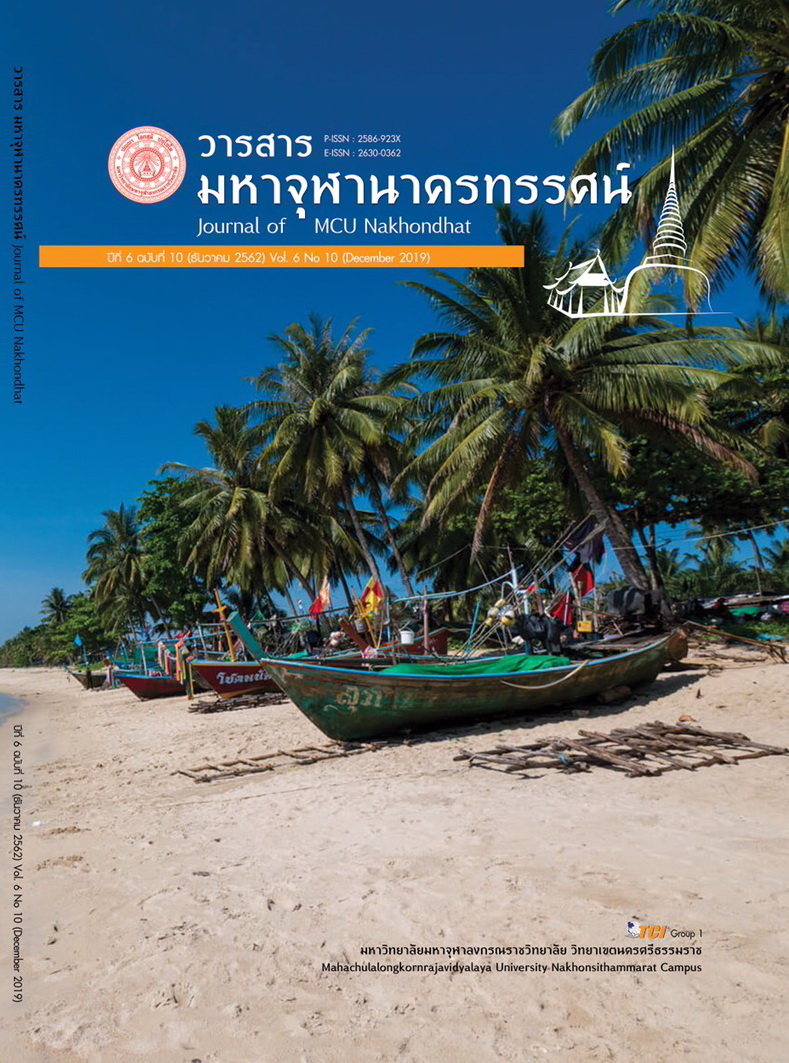REFORM OF THE PUBLIC ADMINISTRATION SYSTEM IN THE CONTEXT OF THAI MONKS
Main Article Content
Abstract
The purpose of this research is to 1) study the problems of Thai monks from the past to the present and the reform of the public administration in the context of the Thai monks. 2) Study the processes of the Thai monks affecting the reform of the public administration in The context of the Thai Sangha and 3) study the approaches for reforming the public administration in the context of the Thai Sangha It is a descriptive study by using qualitative research using in -depth interviews and group discussions. The 3 key informant groups are as follows: The 1st key informant group is 3 executives of the related policy group, the second key informant group is the 3 key operating executives and the key informant group. Group of 20 conversation persons.
The results of the research are as follows:
1) The problems of Thai monks from past to present. The forms of Buddhist traditions may be different. Because Buddhism has been growing for many centuries The way of teaching, behavior has been divided and expanded in many countries. Until there is a culture and tradition The explanations of the teachings of the Master, including the discipline and the steps of the Dharma practice are different. 2) The process of Thai monks affecting the reform of the public administration in the context of the Thai monks. Dhamma practice becomes the doctrine of each religion. Religious expression became various ordinances and religious life became a way of ethics. In order to go the right way As time goes on, culture and traditions continue to accumulate until 1) the doctrine. Doctrine is a fixed doctrine that cannot be denied or questioned. 2) Religious ordinances and rituals without good content. 3) Guidelines Guide to behave in a fair tradition, and 3. Guidelines for the reform of public administration in the context of Thai monks Amendment of the Sangha Act 1962 on issues relating to the synod In order to comply with Article 77 of the Constitution of the Kingdom of Thailand and the resolution of the Council of Ministers.
Article Details
References
ประทุม อังกูรโรหิต. (2562). สถาบันทางพระพุทธศาสนากับงานสังคมสงเคราะห์. กรุงเทพมหานคร: ศูนย์พุทธศาสน์ศึกษา จุฬาลงกรณ์มหาวิทยาลัย.
พระครูโสภณปริยัตยานุยุต (เจมศักดิ์ กิตฺติวณฺโณ). (2557). กลยุทธ์การปกครองคณะสงฆ์เพื่อความมั่นคงแห่งพระพุทธศาสนา กรุงเทพมหานคร. ใน ดุษฎีนิพนธ์พุทธศาสตรดุษฎีบัณฑิต สาขาวิชาการจัดการเชิงพุทธ. มหาจุฬาลงกรณราชวิทยาลัย.
พระธรรมโกศาจารย์ (ประยูร ธมฺมจิตโต). (2549). พุทธวิธีบริหาร. กรุงเทพมหานคร: โรงพิมพ์มหาจุฬาลงกรณ์ราชวิทยาลัย.
พระธรรมปิฎก (ป.อ. ปยุตฺโต). (2538). พุทธธรรม ฉบับปรับปรุง และขยายความ. กรุงเทพมหานคร: มหาจุฬาลงกรณราชวิทยาลัย.
พระมหาสมบูรณ์ วุฑฺฒิกโร. (2562). พระสงฆ์กับสงครามที่ยุติธรรม. กรุงเทพมหานคร: ศูนย์พุทธศาสน์ศึกษา จุฬาลงกรณ์มหาวิทยาลัย.
มหาวิทยาลัยมหาจุฬาลงกรณราชวิทยาลัย. (2553). คู่มือดับทุกข์ฉบับสมบูรณ์. กรุงเทพมหานคร: ธรรมสภา.

